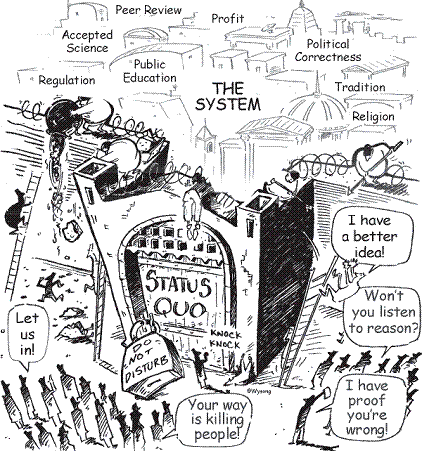Place email address below
for Dr. Wysong's free "Thinking Matters" newsletter/blog
Matter is what we eat, drive to work in, and build our homes out of. We equate matter with the real, so that is where we place our trust and faith. Our day-to-day absorption in this physical reality is therefore what does all the proselytizing. Since materialism reliably answers all of our day-to-day survival needs, questions about nonmaterial matters, such as meaning, purpose and out of body experiences, can seem unimportant and be ignored. If people do not ignore them, they often take large leaps in faith and assume that the high priests of materialism - scientists and clergy - are the only sources of answers to such questions.
Cognitive Dissonance
People tend to see what they believe is already true. Starting with materialistic bias, the weird and paranormal phenomena previously described are cast aside as willful deception, conjuring, or psychopathological and neurotic departures from normal consciousness.
Here's how the blindness of such bias works. If a black nine of hearts is mixed into a deck of playing cards and the cards are then observed one at a time, virtually nobody will see that the nine of hearts is the wrong color. It is assumed that the nine of hearts is the right color so that is how the mind perceives it.
If smokers and non-smokers are polled with the question of whether cigarettes are proven to cause lung cancer, the majority of the smokers say no and the majority of the non-smokers say yes.
People avoid cognitive dissonance, an extremely stressful mental condition caused when facts or observations conflict with what one believes. To put the mind at ease, the facts are ignored, explained away, or ridiculed.
Materialists Are People
This policing, purging, and cleansing process has a face put on it of rational and rigorous attention to detail and method. Scientists and referees would prefer to keep behind closed doors the vulgar and base human instincts of vanity, ego, position, and survival that are, in reality, a part of the inner sanctum operations.
Often, the scientific reviewers are colleagues or competitors of the supplicant desirous of having his thoughts and research published. Thus jealousy, cronyism, venality, fear, settling of old scores, and economic interests play a role. Peer reviewers are people, no better and no worse than any of the rest of us. The idea that science advances because of steely adherence to the scientific method is a myth.
Let me give an example from personal experience. In the Living Life companion book I discussed the dangers to people of a steady diet ofheat-processed foods. I also described the illogical and health destructivepractice of feeding pets a steady diet of such foods under the pretense of"100% completeness." Over two decades ago when I first discovered this, Ienthusiastically wrote documented scientific articles and submitted them toboth human and veterinary medical journals. They were rejected again andagain. In some cases the journals shared with me the letters from the reviewersstating why the articles were rejected. The substance of my articles was notrefuted; rather, the reviewers outlined how my conclusions did not fit acceptedscientific convention. One offered nothing better than an ad hominem attack.Later I learned that every one of the reviewers, although they were eitherscientists or academicians, had economic ties to the food industry.
The aversion to new discoveries like out of body experiences is counter to the very spirit of what science should be. Any basic science text opens with a discussion of the rational scientific method and how pioneers in the field overcame the prevailing error of their time. This leads students to believe that science is pushed along by facts.
But in actual practice it goes more like this. Let's say you had a wonderful job in the auto industry. You made good money, were respected by your coworkers, and had great opportunity to move up the chain. One of your responsibilities was also to sit on the budget committee (be a peer reviewer). One day a research proposal for teleportation was put on the table for funding. Investigators wanted to explore how people could be trained to dematerialize and instantly travel to any place they desired.
Even if there was good evidence that such a thing might actually be possible, would the thought not come to your mind that this would end the automobile industry and your job? Of course it would. If given the choice of funding this research or another proposal to examine a more efficient carburetor (bringing a possible promotion for you because you work in the carburetor division), is it little wonder why most people would vote down the teleportation project? Would you not be inclined to join with everyone else at the table to have a good belly laugh as the prospectus was dumped in the kooky bin?

It is no wonder answers to The Big Questions have not been forthcoming. Given that convention and old school materialistic bias as manifest in evolution and religion prevent fresh thinking and new ideas, one must assume that truth will only emerge where it seems least likely. That is, not from the close-minded experts and standard bearers, but from people - even ordinary ones - who do not fear the new and unusual horizons, like out of body experiences, where open and honest thinking leads.
We will see where our search leads momentarily, but first let's examine how the nay-sayers would like to prevent us from even trying.
